|
|
|
Sort Order |
|
|
|
Items / Page
|
|
|
|
|
|
|
| Srl | Item |
| 1 |
ID:
167663
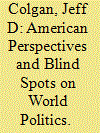

|
|
|
|
|
| Summary/Abstract |
Scholars of international relations (IR) from the United States, like any country, view the world with particular perspectives and beliefs that shape their perceptions, judgments, and worldviews. These perspectives have the potential to affect the answers to a host of important questions—in part by shaping the questions that get asked in the first place. All scholars are potentially affected by national bias, but American bias matters more than others. This special issue focuses on two issues: attention and accuracy in IR research. While previous scholarship has raised principally normative or theoretical concerns about American dominance in IR, our work is heavily empirical and engages directly with the field's mainstream neopositivist approach. The collected articles provide specific, fine-grained examples of how American perspectives matter for IR, using evidence from survey experiments, quantitative datasets, and more. Our evidence suggests that American perspectives, left unexamined, negatively affect our field's research. Still, the essays in this special issue remain bullish about the field's neopositivist project overall. We also offer concrete steps for taking on the problems we identify, and improving our field's scholarship.
|
|
|
|
|
|
|
|
|
|
|
|
|
|
|
|
| 2 |
ID:
084347
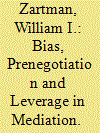

|
|
|
|
|
| Publication |
2008.
|
| Summary/Abstract |
Although analysts have long held that bias disqualifies a mediator, more recent analysis, pioneered by Saadia Touval, shows that bias can be quite helpful to mediation under the assumption that the mediator delivers the agreement of the party toward which it is biased. Of course, the mediator is still expected to be trustworthy in dealing with the parties and reliable in communications. Prenegotiation and diagnosis, probably the least analyzed early stages of negotiation, are shown to be crucial to a successful negotiation and the necessary preconditions to an efficient and effective process. Leverage, the term for "power" in negotiation, is a scarce resource and takes the form of effective persuasion rather than material inducements and punishments; it depends above all on the need of the conflicting parties for an agreement, which in turn depends on the attractiveness of their alternatives or security points (BATNAs).
|
|
|
|
|
|
|
|
|
|
|
|
|
|
|
|
| 3 |
ID:
190100
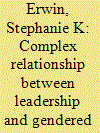

|
|
|
|
|
| Summary/Abstract |
Leadership, whether through response, composition, representation, or direction, reflects a complex relationship with gender in the military. The findings of this qualitative study highlighted the profound and complex relationship between leadership and gendered experiences within the military in a variety of facets including within various ranks, from superiors, subordinates, and peers, as well as both as and with leaders. This includes considerations, or lack thereof, for issues pertaining to representation, voice, gender bias, stereotyping, and intersectionality in addition to the significant and prominent issues of sexual misconduct. Military leadership development efforts, both at large and for women in particular, must reflect the pivotal role which leadership plays while simultaneously acknowledging the unique cultural and contextual environment of the military. In addition to continued efforts to encourage and enable women’s military service and leadership, military and civilian leadership, regardless of gender, should be cognizant of the magnitude of leader roles and responsibilities pertaining to gender.
|
|
|
|
|
|
|
|
|
|
|
|
|
|
|
|
| 4 |
ID:
124356
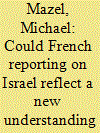

|
|
|
|
|
| Publication |
2012.
|
| Summary/Abstract |
The media in France show an inordinate interest in the Middle East and more specifically in the Palestinian issue and Israel. Not a day passes without a news item, an article, and several blog posts on the subject. Each year ushers in a new crop of essays on this topic, while other weighty matters, such as human rights in China or the neverending food crisis and endemic corruption in Africa get short shrift. The subject never fails to fascinate the public. Writing about the settlements or the blockade of Gaza will prompt hundreds of talkbacks, a fact well known to editors of websites such as Rue891, which rely heavily on advertising to survive.
|
|
|
|
|
|
|
|
|
|
|
|
|
|
|
|
| 5 |
ID:
177568
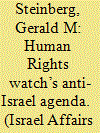

|
|
|
|
|
| Summary/Abstract |
The influence of Human Rights Watch (HRW) is reflected in the organisation’s intense involvement in institutions that emphasise human rights, including the United Nations and the International Criminal Court. However, HRW and its leaders have been strongly criticised for intense political and ideological bias against Israel and for proliferating unsubstantiated accusations to fit this bias. This article documents the role of Kenneth Roth, Executive Director since 1993, in this politicisation. Roth’s direct involvement with Israel-focused activities is fundamentally different from his role on other topics and countries on HRW’s agenda, and contrasts strongly with norms of universality and political neutrality.
|
|
|
|
|
|
|
|
|
|
|
|
|
|
|
|
| 6 |
ID:
175282
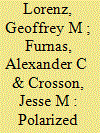

|
|
|
|
|
| Summary/Abstract |
For decades, critics of pluralism have argued that the American interest group system exhibits a significantly biased distribution of policy preferences. We evaluate this argument by measuring groups’ revealed preferences directly, developing a set of ideal point estimates, IGscores, for over 2,600 interest groups and 950 members of Congress on a common scale. We generate the scores by jointly scaling a large dataset of interest groups’ positions on congressional bills with roll-call votes on those same bills. Analyses of the scores uncover significant heterogeneity in the interest group system, with little conservative skew and notable inter-party differences in preference correspondence between legislators and ideologically similar groups. Conservative bias and homogeneity reappear, however, when weighting IGscores by groups’ PAC contributions and lobbying expenditures. These findings suggest that bias among interest groups depends on the extent to which activities like PAC contributions and lobbying influence policymakers’ perceptions about the preferences of organized interests.
|
|
|
|
|
|
|
|
|
|
|
|
|
|
|
|
| 7 |
ID:
167669
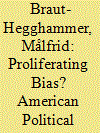

|
|
|
|
|
| Summary/Abstract |
This article examines whether there is a US bias affecting how American political scientist study nuclear weapons and their effects. US dominance in the production and dissemination of political science literature on nuclear weapons is reflected in concepts and theories of their spread and use, as well as prominent datasets on nuclear proliferation. More broadly, is there a US bias in scholarship on nuclear weapons produced by American political scientist? In this article I examine whether there is a US bias that affects what is studied, what kinds of questions are asked and what cases are examined, and how the evidence is interpreted.
|
|
|
|
|
|
|
|
|
|
|
|
|
|
|
|
| 8 |
ID:
165331
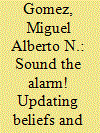

|
|
|
|
|
| Summary/Abstract |
To date, cyber security research is built on observational studies involving macro-level attributes as causal factors that account for state behaviour in cyberspace. While this tradition resulted in significant findings, it abstracts the importance of individual decision-makers. Specifically, these studies have yet to provide an account as to why states fail to integrate available information resulting in suboptimal judgements such as the misattribution of cyber operations. Using a series of vignette experiments, the study demonstrates that cognitive heuristics and motivated reasoning play a crucial role in the formation of judgements vis-à-vis cyberspace. While this phenomenon is frequently studied relative to the physical domain, it remains relatively unexplored in the context of cyberspace. Consequently, this study extends the existing literature by highlighting the importance of micro-level attributes in interstate cyber interactions.
|
|
|
|
|
|
|
|
|
|
|
|
|
|
|
|
| 9 |
ID:
102492
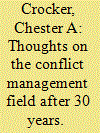

|
|
|
|
|
| Publication |
2011.
|
| Summary/Abstract |
This article surveys the emergence of conflict management from the academic and policy shadows into a far more prominent field of inquiry and practice. As the barriers to entry into third party roles collapsed at the end of the Cold War, the field of conflict management expanded, diversified, and fragmented into a range of practice areas (scholarly, policy-oriented, and operational). Four phases of this evolution are identified. An increasingly crowded field lacks gatekeepers or natural coherence, underscoring the need for leadership and sustained, coordinated efforts. The study of mediation has blossomed around the work of Zartman and others, while the policy community has swung back and forth in its enthusiasm for third party roles in an age where hard power and smart power vie for pride of place. Conflict management responses are increasingly spontaneous, ad hoc and case-specific. Debate is emerging over the pros and cons of engaging with armed non-state actors that are placed on proscribed lists in the struggle against terrorism. Post-conflict challenges continue to pose a severe test to practitioners of peacebuilding.
|
|
|
|
|
|
|
|
|
|
|
|
|
|
|
|
| 10 |
ID:
167671
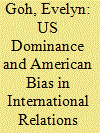

|
|
|
|
|
| Summary/Abstract |
This article responds to the Journal of Global Security Studies special issue on “American Perspectives and Blind Spots on World Politics,” edited by Jeff Colgan. It applauds their significant achievement in offering positivist demonstrations of the bias generated by American assumptions, coding, and preferences, and quantitative demonstration of the systemic and systematic impact of this bias in skewing key assumptions and theories in mainstream US international relations (IR), by selectivizing attention and compromising accuracy. The article pushes the envelope further by arguing that the call to arms is more urgent and more significant than Colgan et al. express. As US hegemony is diluted, the discipline of IR must increasingly account for other parts of the world. Here, cultural bias generates deeper problems with both ontology and epistemology. The article reviews the wider IR field that shows how IR is at once more global and less easily generalizable, driving the imperative to expand the universe of cases for qualitative research. It warns that the problem of US bias and the wider issue of insularity is accentuated by the growing distance between IR scholarship as expressed in top journal publications and “real-world” puzzles and empirical reality—and by ongoing changes in how governments provide state support and funding for IR research and training.
|
|
|
|
|
|
|
|
|
|
|
|
|
|
|
|
|
|
|
|
|